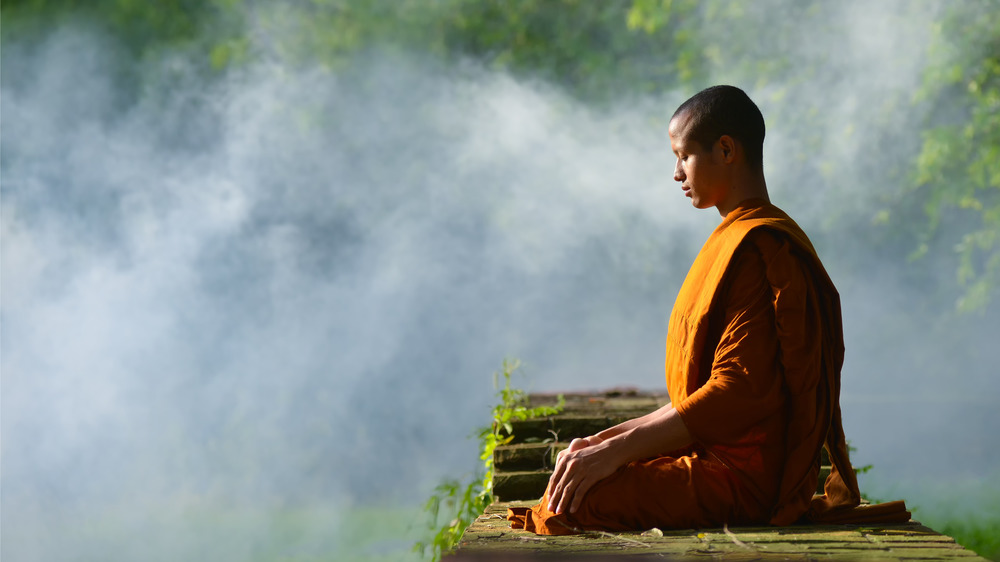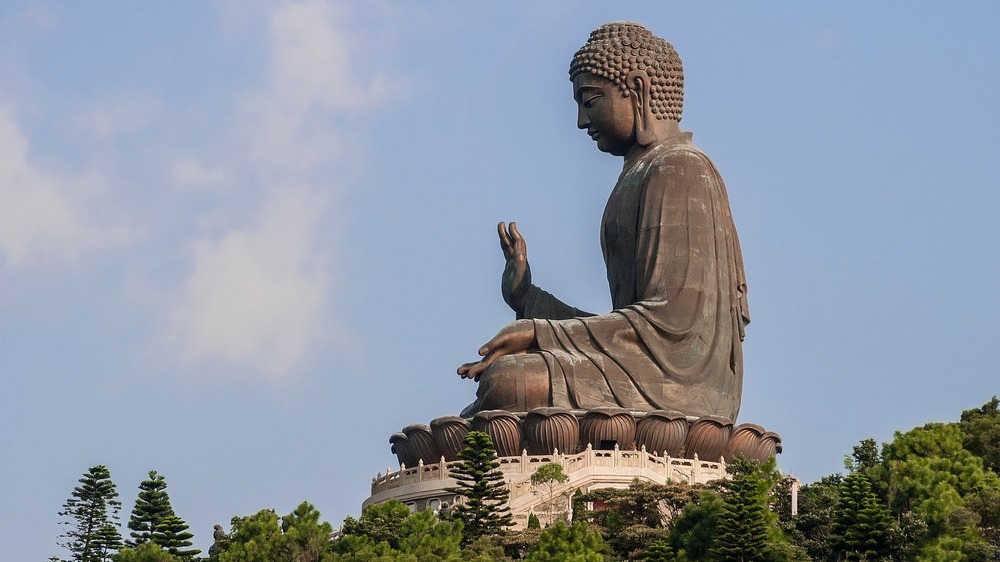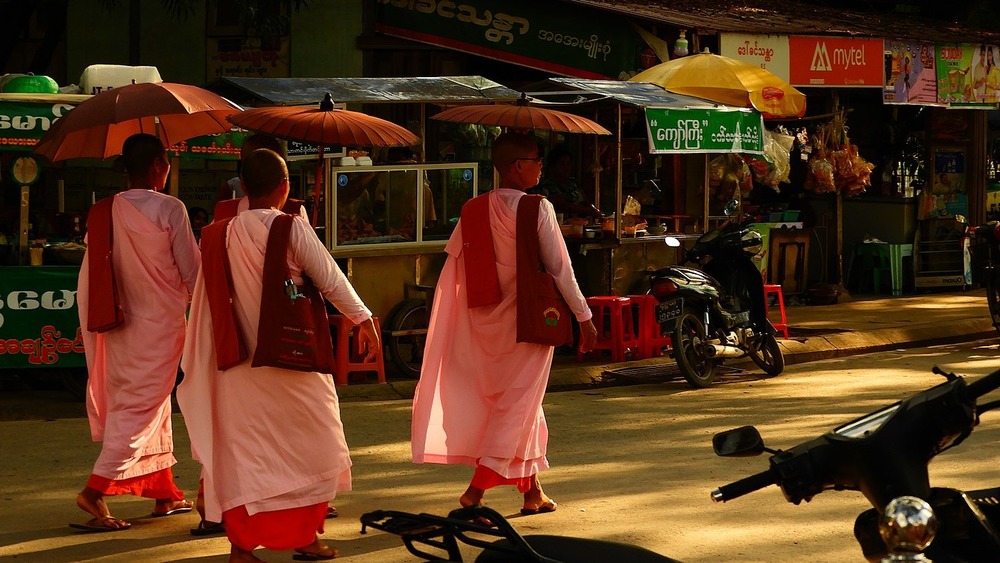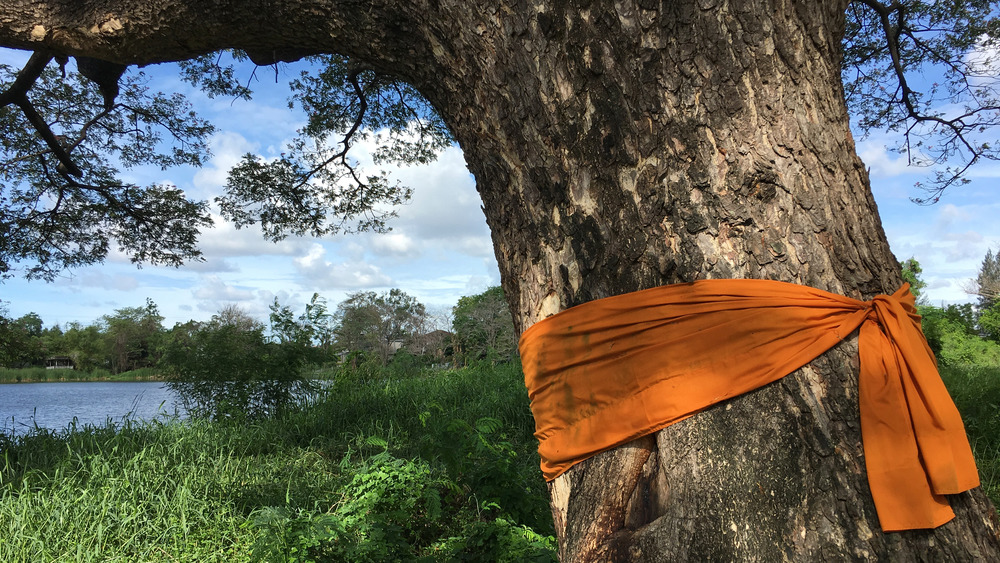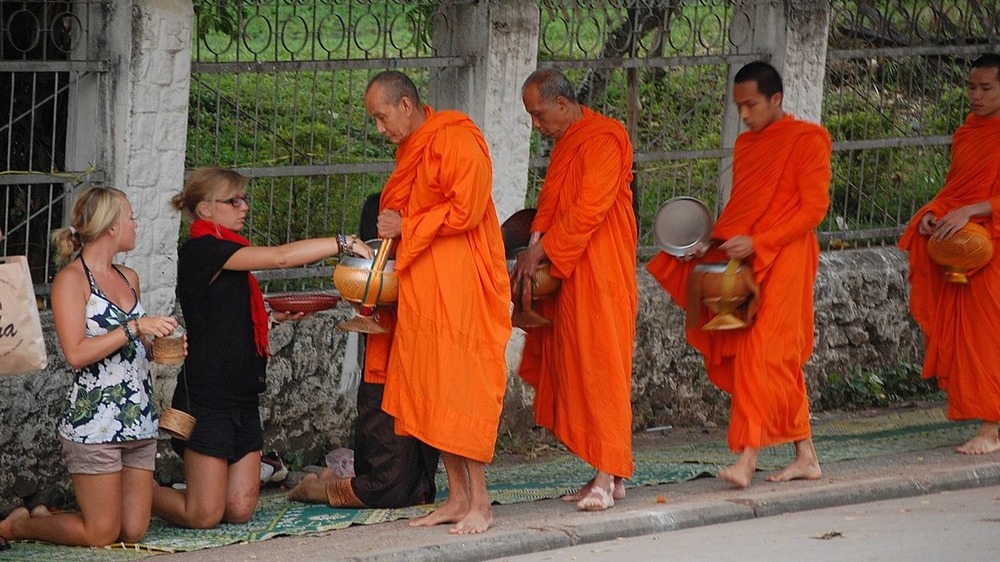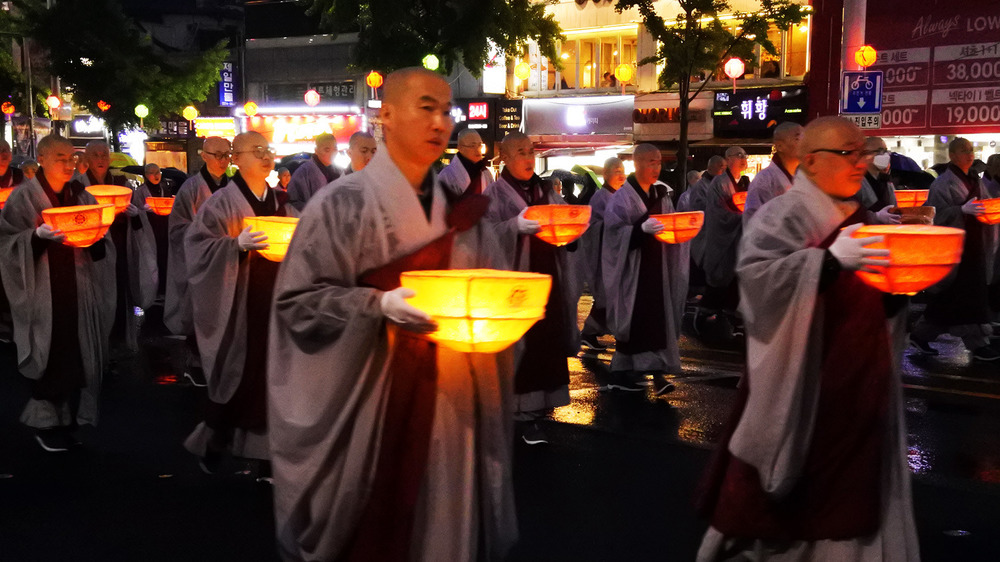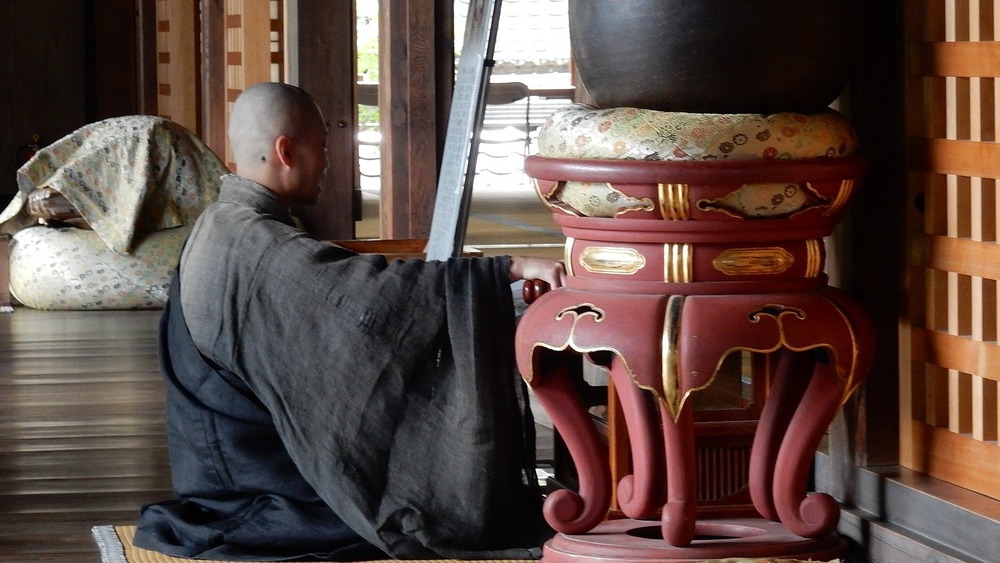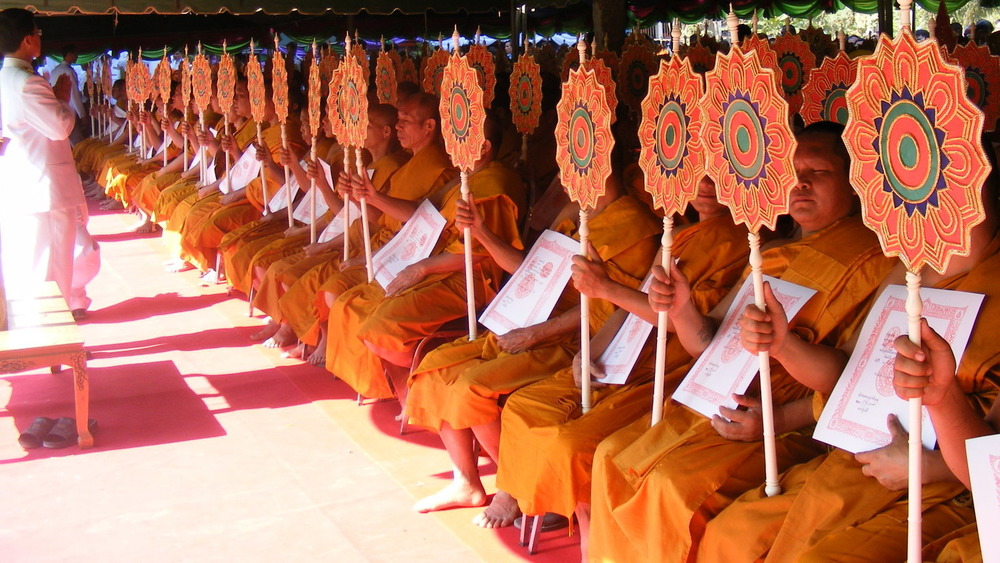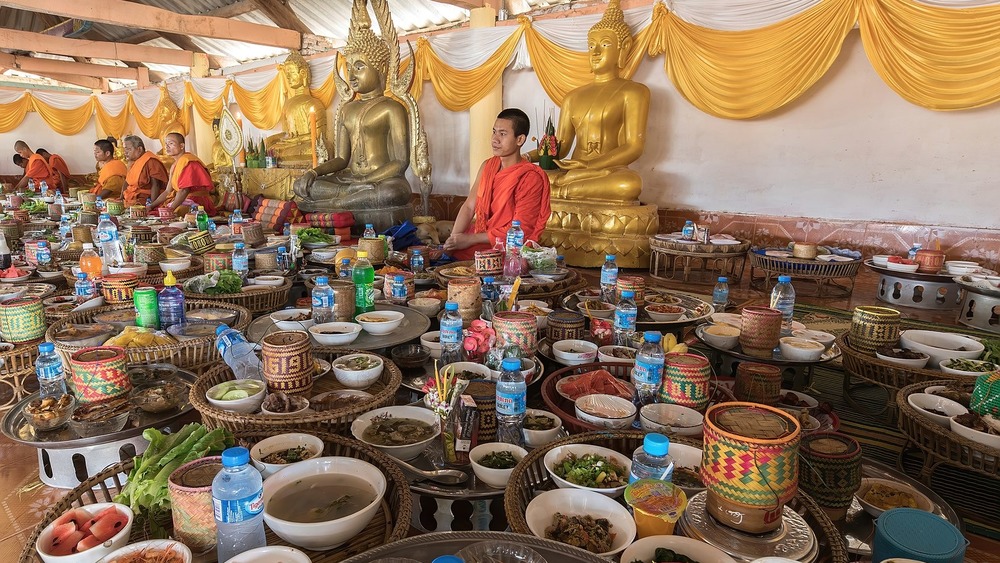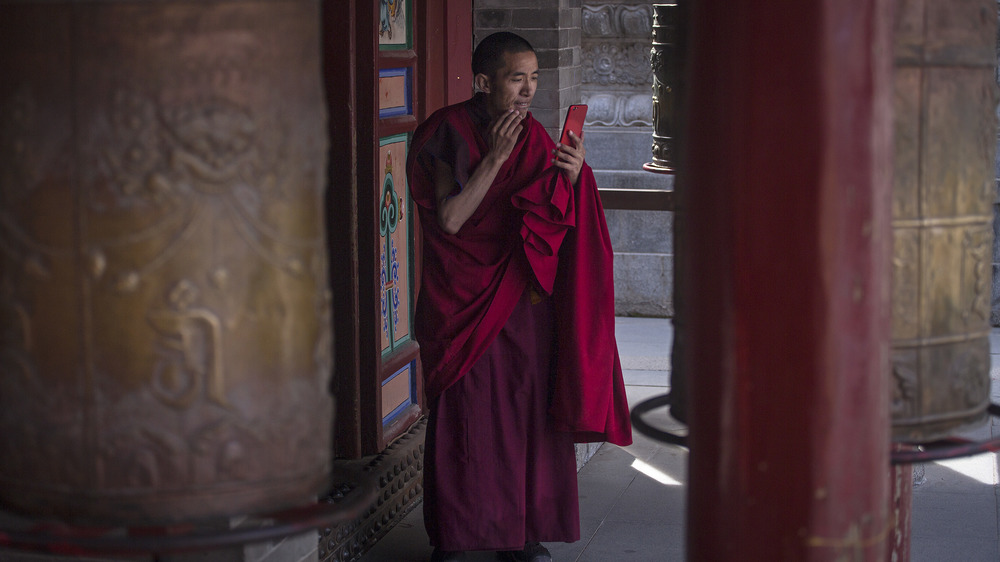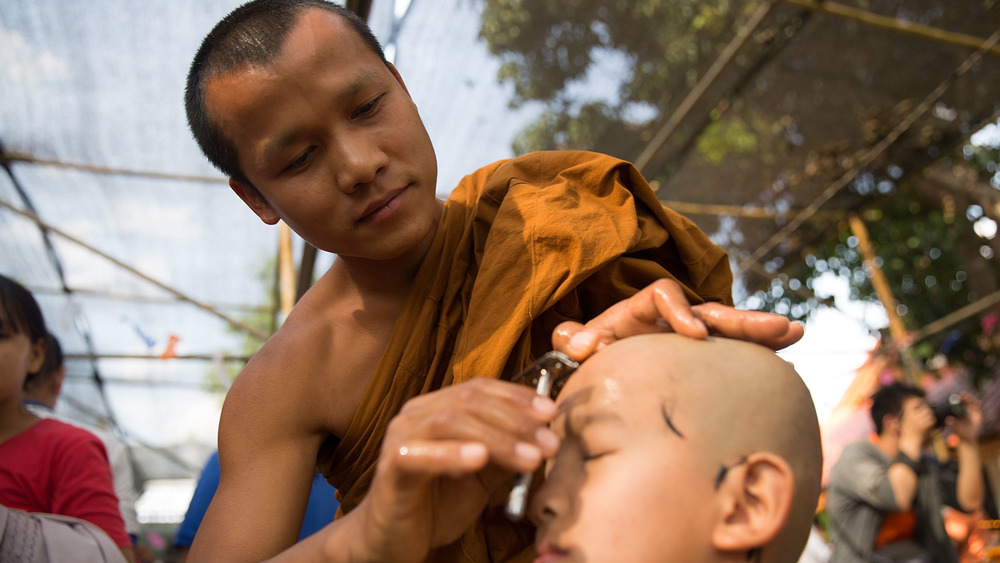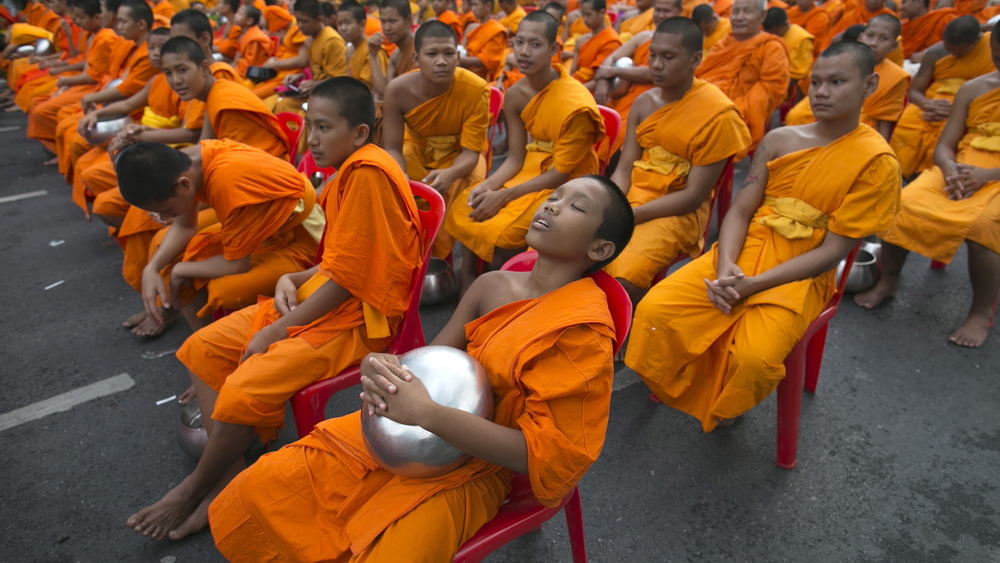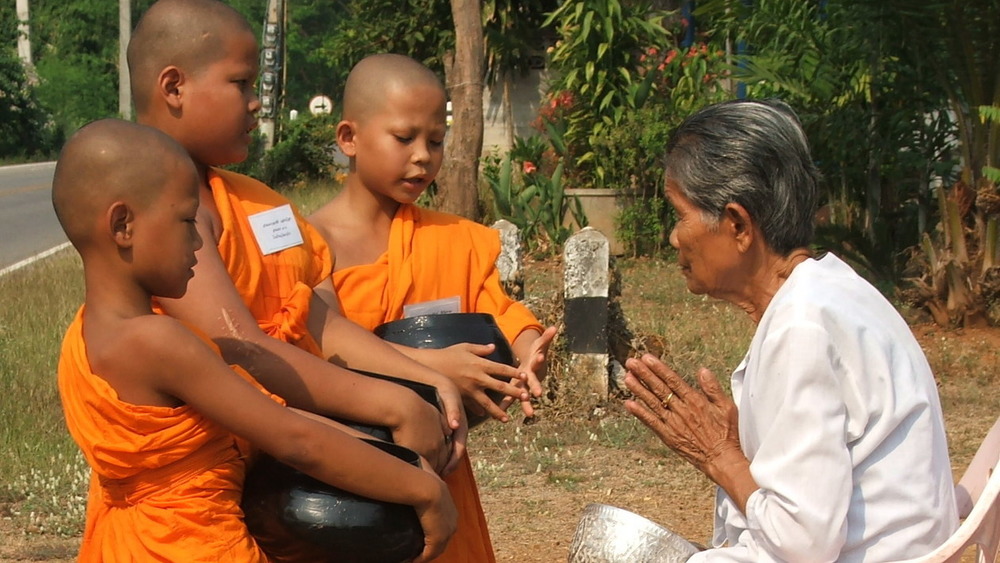Rules That Buddhist Monks Have To Follow
Buddhism, which started about 2,500 years ago in India, is one of the world's oldest religions with some venerable rules. According to National Geographic, the main concepts of Buddhism were developed by Siddhartha Gautama who taught the Four Noble Truths. These argued that the human condition was an endless one of suffering with humans on an eternal journal of rebirth and death. The only way to end this cycle was to end suffering, which was caused by desire. Only then could a person achieve a state of enlightenment called nirvana. Gautama, who was the first to achieve enlightenment, was titled the Buddha, which means the "Enlightened One." The religion spread rapidly across India and Asia. The Pew Research Center reports that as of 2010, there were 488 million Buddhists around the world.
Most practitioners of Buddhism are secular, but a minority of them have turned their lives over to the goal of attaining enlightenment. These are Buddhist monks and nuns. As with other religions, serious devotees have to obey stringent monastic rules. Most of these rules were developed by the Buddha himself, or, as Ann Heirman, writing for Penn State University explains, shortly after his death. But with over two millennia of history, these rules have naturally evolved.
Different branches, similar rules
Buddhism developed into several branches over the millennia. National Geographic identifies the two main traditions of Buddhism as the Mahayana and Theravada traditions. Mahayana is mainly practiced in China, Japan, Tibet, Korea, and Mongolia, while Theravada is practiced in southeast Asia and Sri Lanka. Of these two traditions, Theravada emphasizes monasticism to achieve enlightenment while the Mahayana tradition focuses more on the role of bodhisattvas, people who have achieved enlightenment, who have returned to teach others.
Even though Theravada emphasizes the lifestyle of a monk or nun, all sects of Buddhist monasticism have rules. A good example of a monastic tradition would be Zen Buddhism, which is considered, according to Britannica, the primary form of mainstream monasticism in Mahayana sects. Another case of Mahayana monasticism is found in Tibetan Buddhism, which is headed by probably the most famous Buddhist monk in the world, the Dalai Lama. According to the BBC, the monastic tradition in Tibet was so strong that before the Chinese conquered the country, it was believed that one of every six males in Tibet was a monk.
All these monks and nuns live according to similar, basic rules meant to bring them closer to enlightenment.
The Ten Precepts
Ann Heirman explains that the main text that contains the rules for Buddhist monks and nuns is called the Vinaya. According to Kenyon University, the rules are broadly based on precepts which, depending on your branch of Buddhism and your status, may range from five to ten precepts, or rules. For example, practicing Buddhists commit themselves to the first five precepts, but monks and nuns would commit to the full set. When one looks at the precepts as published by Northern Kentucky University, for the Theravada tradition it is notable that there is direct overlap on the serious offenses, such as murder, theft, and sexual misconduct.
Monks and nuns are obliged to follow the rulebook of the Pratimokṣa (or the Pātimokkha in Pāli), which gives instructions specifically to monks and nuns. According to Northern Kentucky University, violations of the code carry an order of magnitude. The worst offenses would result in derobing and expulsion from the sangha (the Buddhist community), while lesser offenses may require just confession. Each tradition has different numbers of rules ranging from 218 to 380, with Buddhist nuns being given more rules to follow. These are detailed instructions for how to live life as a Buddhist monk or nun. Let's look at some of those rules in the context of Theravada's Ten Precepts. At the end, you can then decide if a Buddhist monastic life is right for you.
Buddhist monks must not hurt living creatures
The first of the Ten Precepts as described by the BBC is that Buddhist monks and nuns are forbidden to take life or hurt living creatures. Acts like murder, suicide, and assisting others to murder are all considered to be, as described by Northern Kentucky University, grave enough to result in the expulsion of the monk from his order. Nonviolent rules extend further. According to the journal Trumpeter, while humans are the highest form of life, other life is sanctified as well. Buddhist monks and nuns are therefore forbidden to cut down trees or harm plants since they may harbor life. They are forbidden to plow the ground since there may be animals in the soil. What is more, some monks even strain water before they drink since there may be small insects within the water. If a monk or nun broke one of these latter rules, they would not be derobed but rather made to confess the offense.
This moral outlook has given rise to a strong environmental and ecologically friendly streak within Buddhism. One example of this, as reported by JSTOR, is that in Thailand, some monks symbolically ordain trees as monks in order to preserve them. They are marked with an orange robe, meaning that to kill the tree is to kill a monk.
Buddhist monks may only take that which is given
The second of the Ten Precepts is that Buddhist monks and nuns (and all Buddhists for that matter) may not take that which is not given. Ideally, Northern Kentucky University reports that monks should only possess three robes, a waistband, razor, water filter, and a thread and needle. A monk should therefore receive everything he needs from others as freely given. If a monk were to steal an item, he would be cast out of the order. Interestingly, monks are also not supposed to beg but instead are supposed to wait for something to be offered.
In Thailand, for example, Theravadan monks go on morning alms rounds for their food, according to the Conversation. In this case, they accept offerings in their bowls. Diligent monks could only accept the bare necessities being clothing, alms for food, shelter, and medicine. Monks are in fact entirely dependent upon the lay community. This has had some unintended consequences. For example, The New York Times reported in 2018 that monks in Thailand were growing obese because of donation of sugary drinks, sweet foods, and high carbohydrate prepackaged foods. During the Coronavirus pandemic, monks have continued this practice, wearing masks and keeping socially distant.
Buddhist monks may not have sex or hug their mothers
The third of the Ten Precepts has to do with sexual misconduct. Sexual craving was by the Buddha considered to be a major cause of suffering. In addition, even love of others can result in suffering. Tricycle Magazine quotes the Buddha, "For one who has formed bonds, there is affection; following on affection, this suffering arises. Discerning the danger born of affection, one should live alone like a rhinoceros horn."
As Tricycle notes, Buddhist monks and nuns are to be celibate. The purpose of this rule is to prevent monks from being caught up in sensual passion. The rule was evidently instituted by the Buddha after a monk was convinced by the family he had left to go back and sleep with his former wife.
The rules of the Pratimokṣa are pretty straightforward. If a monk has any form of sex, then they are derobed. If a monk touches a person in a sexual way, it requires a meeting of the sangha to resolve him. The same is true of flirting. Monks are also not supposed to be alone with a woman. Curiously, in several traditions, if a monk even touches his mother out of affection, it is considered to be a moderate offense since the monk is supposed to remove himself from all worldly attachments.
Notably these types of rules, as reported by the BBC, do not apply to practicing Buddhists who are encouraged to enjoy sex responsibly.
Buddhist monks may not speak badly of others
One important part of the Buddhist Eightfold Path, the actual discipline to prevent suffering, is "Right Speech." According to the Noble Eightfold Path, right speech means to avoid slander, harsh speech, lying, and idle gossip — these guidelines extend to writing. The Buddha said to his monks that while some may speak harshly to them, a monk must remain detached. He said, "Our minds will be unaffected and we will say no evil words. We will remain sympathetic to that person's welfare, with a mind of goodwill, and with no inner hate. We will keep pervading him with an awareness imbued with goodwill and, beginning with him, we will keep pervading the all-encompassing world with an awareness imbued with goodwill — abundant, expansive, immeasurable, free from hostility, free from ill-will."
The Pratimokṣa emphasizes this by barring Buddhist monks and nuns from speaking slanderously or lying. This also extends to manipulative speech where a monk may try to slander another in the hopes of getting him disrobed.
Buddhist monks can't go to keggers
Practicing Buddhists typically take a vow to abstain from alcohol, which, according to Britannica, is the Fifth Precept. For Buddhist monks and nuns, however, the ban is absolute. A quote from An Introduction to Buddhist Ethics says that the Buddha said that anybody who followed him must "...not drink any strong liquor, even a drop on the point of a blade of grass."
One central part of Buddhism is to free the mind of attachments. Psychology Today points out that from a Buddhist point of view, substance addiction is the "archetype of attachment" and should be avoided at all costs. The only exception to this rule is detailed in Buddhist Monastic Life, which allows for the use of alcohol in medicines. However, if too much alcohol is added to the medicine, it is deemed undrinkable, and it can only be used as an ointment.
Tricycle quotes a Buddhist Lama as saying, "Intoxicants take you away from reality; meditation takes you toward reality. Which do you want? You are already intoxicated by ignorance, anger, and attachment and suffer as a result. Why do you want to take more intoxicants?"
Therefore, consumption of alcohol is not a sin in the traditional sense but rather a means by which a person's judgment becomes clouded.
Buddhist monks can't eat in the afternoon
Buddhist monks and nuns have restrictions on food and eating. The Sixth Precept forbids monks and nuns from untimely eating. This usually means, according to An Introduction to Buddhism, that monks and nuns may only eat solid foods between dawn and noon. The Pratimokṣa notes that even if a monk is sick, they should not eat food between those hours.
As a result, monks often are fasting for 18 hours a day. There are some benefits. Tricycle reports that this type of diet actually fosters a low body mass index (BMI) and has even given rise to a pop diet book.
Heathline reports other differences in Buddhist diets in general. Buddhists are usually lacto-vegetarian, with the idea that the consumption of meat requires killing. Some Buddhist monks and nuns, however, do eat meat as long as the meat wasn't killed specifically for them. As the Huffington Post reports, because Buddhist monks and nuns are required to live off of what is given to them, some will accept and eat meat.
Buddhist monks may not go to rock concerts or dance clubs
The Seventh Precept has to do with entertainment. The original text states that monks and nuns swear "to abstain from dancing, singing, music and unseemly shows." At the time of the Buddha, it was thought that taking part in such worldly activities might create attachment. In the modern era, Buddhanet remarks that this rule has been extended. Televisions and videos are prohibited, except an occasional educational documentary. While it is not mentioned, it can be safely assumed that monks and nuns are prohibited from owning anything remotely resembling a Playstation or Nintendo.
There are, however, some exceptions among the different Buddhist sects. According to History of Religions, music is used in various Chinese Buddhist practices. Yet it is important to note that the music's intent is not to entertain but rather to open up a person to enlightenment. PBS describes how chanting is also used in various practices, most famously in Tibetan Buddhism.
Buddhist monks can't wear cologne or wear Louis Vuitton
The Eighth Precept states that monks and nuns must "abstain from wearing garlands, smartening with scents, and beautifying with perfumes." This essentially means the monks and nuns need to dress simply. The Pratimokṣa describes how monks were to wear simple robes that were made from patchwork scavenged cloth. This has evolved into a standard kind of robe that varies in colors from donated materials, which according to Medium, bears no other significance other than what was locally available to dye the robes.
This simplicity is closely related to the rite of Pabbajja, which according to Advance Philosophy of Education, was where a person first takes the monastic vows, shaves his head, and joins the order as a novice.
These practices, as with the other restrictions upon Buddhist nuns and monks, was to create a simple environment where he or she could practice free of attachment and worldly distraction.
Buddhist monks can't sleep on a four-poster bed
The Ninth Precept forbids monastics from "the use of high and large luxurious couches." Practically speaking, this was to avoid having any luxuries. This rule resulted, according to Buddhist Monastic Life, when Buddha's early followers began to receive gifts of elaborate furniture and were accused of extravagance. When this was heard by the Buddha, he forbade fancy furniture. As a result, Buddhist monks sleep on simple beds that are near to the ground. Restrictions on sleep have been taken to extremes at some monasteries. One example, as reported by the BBC, was a group of monks who went on a retreat in Scotland for four years with the restriction that they must sleep upright for less than five hours per day. Admittedly, no one was checking on them since they were in individual rooms.
According to Ann Heirman writing in Acta Orientalia Academiae Scientiarum Hungaricae, part of the reason for such sleeping practices is because of a general negative attitude toward sleep in Buddhism. First, it is perceived that when one is asleep, one loses control of oneself. Second, sleep can be perceived as a sign of laziness. Third, sleep is often associated with sexual activity. This has led to rules where monks and nuns cannot sleep in the same place with others who are not fully ordained. Other rules in certain Chinese Buddhist practices detail that monks should approach the bed mindfully, not lie on one's stomach or even yawn.
Buddhist monks can't take money
Buddhist monastics rely on the community for gifts of food and lodging. What monks are absolutely forbidden to take, according to the Tenth Precept, is money. While the original rules in the Pratimokṣa forbade the handling of gold and silver, this was later extended to other forms of money. Monks were also forbidden to barter, buy, and sell. One rule even forbids monks from even touching lost valuables unless they are found in the monk's dwelling place.
These rules have been interpreted strictly or not strictly depending on the sect. Some monks interpret the instruction on gold and silver as not applying to paper cash or checks since they are not physically silver or gold. The Association for Asian Studies reports that Buddhist monasteries in China and Japan have had a long history of lending money to the community. There could be karmic consequences if you didn't repay a monastery loan, including being reborn in a lower state. How is the money handled if the Buddha banned the practice? According to Buddhanet, the monks themselves never handled the money but stewards of the monastery.
Interestingly, there have been recent cases of fake monks begging for money, obviously against the monastic code. As reported by the The New York Times, these monks operated in cities throughout the world offering Buddhist trinkets in exchange for a cash donation. If the donation was too small, they would snatch it back.
